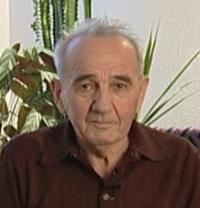“My mind has been led by God, who has always helped me and he always will.”

Download image
Karol Maník was born on March 2, 1928 to Anna nee Pribulová, and Mikuláš Maník in the village of Hradisko in Prešov district. He came from the large peasant Orthodox family. Karol completed eight grades in a public school. In 1948, on request of his parents, he married his schoolmate Mária, nee Olejárová. After the wedding, he did the driving course and started to work as a driver in Prešov where he lived with his wife in lodging. It was the first time he met a CIC agent V. Palkovič, who he later started to cooperate with. Karol Maník was given the code name Orol (Eagle). Gradually he asked his father and his elder brother to cooperate as well. In 1950 he was sentenced to life imprisonment for these activities and espionage, but thanks to the amnesty in 1960 he was granted a pardon and released from the prison. After more than ten years spent in the prison, he came back home and started to work as a bricklayer. After many years of separation, three children were born to the married couple within the following three years. The youngest son secretly studied theology.

